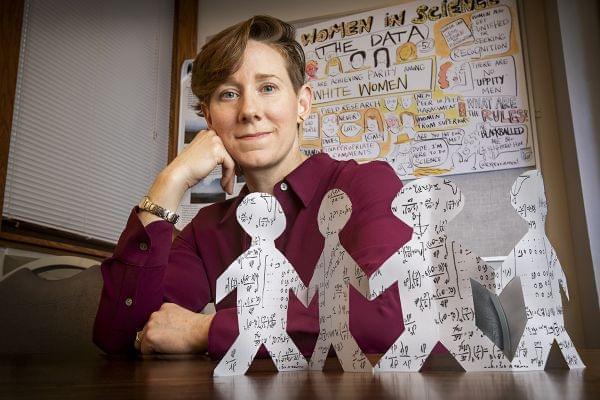Researcher: Sexual Harassment Just The ‘Tip Of The Iceberg’

U of I professor Kathryn Clancy co-authored a report that found high numbers of young women in the field of physics reported experiencing sexual or gender harassment. Fred Zwicky/Illinois News Bureau
A report published Monday in the journal Physical Review Physics Education Research finds that undergraduate women in physics report high levels of sexual and gender harassment in their field.
University of Illinois anthropology professor Kathryn Clancy co-authored the study, which surveyed hundreds of undergraduate women at a physics conference. Nearly three quarters of them reported experiencing some form of harassment already in their career.
Clancy spoke with Illinois Public Media about the survey’s findings and how to address the problem of gender harassment in science.
The interview below has been lightly edited for length and clarity.
What did the survey measure?
That survey allows us to look at sexual harassment, but also different types. So, things like unwanted sexual advances - which are really what most people think of when they think of sexual harassment - but also gender harassment. Those are the sexist forms of harassment that are kind of contemptuous behaviors towards women, like saying, “Women don't belong in physics,” or “You must be the affirmative action hire,” as well as sexual forms of gender harassment, which are more crude behaviors - showing pornographic images or making lewd jokes that make women feel excluded.
You mentioned when we think of harassment, we tend to think of sexual harassment. Can you explain what gender harassment is and why it can be so detrimental in the workplace?
There have now been several large scale studies and meta-analyses of American workplaces to look at sexual harassment and specifically gender harassment. What we're seeing is that because gender harassment is often more frequent and because it creates this sort of exclusionary feeling, these little contemptuous behaviors that dig at your place at work. They often have worse professional and personal consequences than some of these more severe but infrequent forms of harassment, like unwanted sexual advances.
In fact, I was a co-author of The National Academies report that came out last year on sexual harassment in the sciences. We surveyed 30 years of data and we found, pretty unequivocally, that gender harassment is the most common form of harassment and also that, while it’s underreported and under discussed possibly as damaging or more damaging than unwanted sexual advances or sexual coercion.
You've done several studies on this topic, so what was different about this one focusing on the experiences of women in physics?
The difference with this one is twofold. One is, we were just asking undergrads and what is devastating to me is we're talking about 18-, 19-, 20-year-old women who are just talking about the last year or two of their experience in physics. They're not talking about a 30-year career; Just in the last year or two they're saying, “Yes, I've had these experiences.”
The other difference is we were able to tie it to some outcomes that we haven't looked at and some of these other data sets so seeing that with increased experiences of gender harassment, we're seeing a decreased sense of belonging in physics. With increased gender harassment, we're also seeing that these women are more likely to attribute their success to things like luck over ability.
And really what we're seeing is that the treatment of women in these places really erodes their sense of belonging, erodes their ability to do their best work. It's very likely that being a woman is actually holding them back from being able to succeed and achieve at the same rate as men. And it's bad enough to be told things like, “You're only here because of your identity," but then for the inverse to actually be true that in some ways you're here in spite of your identity is really harmful.
Do you have any recommendations for how we can address the problem?
It's not just professors hitting on students - that is absolutely part of what's happening, but that is the tip of the iceberg, really.
What lies beneath, what is more treacherous when we think about harassment, is gender harassment. If we acknowledge that - which, again, 30 years of data is telling us is the case - it means everything we do to address harassment right now is completely wrong because we train people around definitions of sexual harassment. We do Title IX training and everything with this understanding that the biggest thing that we have to attack is the tip of the iceberg.
We are not doing anything to teach people about how to stop perpetrating gender harassment, about how to penalize, about how to get people even to engage in a productive way to get people to talk about these kinds of behaviors.
And we have an entire incentive system in the sciences that is permissive of just general cruel and uncivil and disrespectful behavior. If you already have all of those things in place, gender harassment is just going to keep happening, no matter how many trainings you have telling professors to stop sleeping with students.
Links
- Ex-UI Administrator Fired From University Of Tennessee After Sexual Harassment Case Made Public
- Documents Show Sexual Harassment Allegations Against Jay Kesan Date Back To 2002
- U Of I Law School Dean Apologizes For Sexual Harassment Case Involving Professor Jay Kesan
- Sexual Harassment Researcher: Most Workplace Training Falls Short

